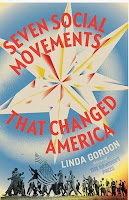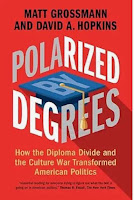As today is a National Day of Hands Off protest, I thought I would post about a new book from a prolific social commentator. She writes, “Lincoln warned in 1838 that if the United States of America died it would be by its own hand. But what we have is more like assisted suicide. It is easy to love your homeland and hate your government. I've done it all my life and consider myself in the company of patriots…. You love it like a child and you love it like a parent, with an irrational depth and the fiercest desire to protect it from harm. You mourn the lost leverage of the ordinary American -- of elections, of courts, of protest, of documentation. You remember when those things seemed to matter or at least when the powerful felt obligated to pretend they did.” THE LAST AMERICAN ROAD TRIP by Sarah Kendzior (The View from Flyover Country) is generally VERY well-written, but oh so sad as America experiences such an unnecessary demise.
Just a couple of weeks into the new administration, Publishers Weekly described this text as a “poignant portrait of life in the Trump era.” I read (and listened to) a preview of THE LAST AMERICAN ROAD TRIP a few months ago and found then that I had to do so in shorts bursts – partly to reflect on her emotional writing and partly because this book can be upsetting. Given the events of the past two months, Kendzior’s comments seem even more prescient (and distressing) now. Kendzior writes at length and with much affection about Missouri, Mark Twain, and her efforts to expose her own children to the American Heartland between 2016 and now, saying, “A lot has changed since we first hit the road. My daughter went from being a fourth grader to a twelfth grader. My son went from being a kindergartner to an eighth grader. And the United States went from being a flawed democracy to a burgeoning autocracy; we drove past the point of no return and kept on driving.” She writes so expressively; for example, “raising children in the world running out of time means contending with two clocks ticking at once: the moments you spend with them as they grew up and the years left for your country, for the planet, for everyone. The first clock is a marvel of memory. The second a countdown to doom. You cannot live your life by these clocks, only alongside them. You forge ahead regardless of the odds because that is your obligation as a parent.”
I could keep
quoting from THE LAST AMERICAN ROAD TRIP for quite a while, but end with this
reflection: “The people who want to destroy my country are banking on us not
missing America. To miss America is to remember America. To remember America is
to explore America. To explore America is to see the best and worst in
everything -- to reconcile, to repent.”




















